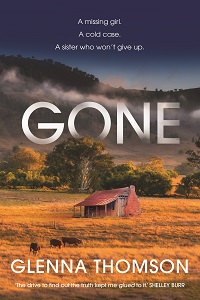
Title: Gone
Author: Glenna Thomson
Pages: 308
Published Date: 6 February 2024
Publisher: Random House Australia
Series Details: stand alone
Publisher's Synopsis
When Rebecca Bundy fails to return home after the last day of school in 1984 her father reports her missing. But the teenager has run away before and recently she’s been bragging about going to Queensland, so the police tell the family to wait it out.
Days pass. Rumours swirl. A man seen loitering near the bus stop might have followed her. Was there something going on between Rebecca and a male teacher? What about the sheep farmer on Glen Lochan Road where she babysat? And why is her boyfriend, the rough cattle guy Bull Tennant, so sure something sinister has happened?
My Review of Gone by Glenna Thomson
Gone is a family drama story that centres around the disappearance of the eldest daughter. For the majority of the story, the disappearance is merely a reference point with the real story being the aftermath and disintegration of the family unit left behind. Heavy on mental health issues, it’s a compelling story that captures the powerlessness and confusion of the left behind loved ones.
It’s the last day of school, 1984, Rebecca and Eliza Bundy are waiting with the other kids for the school bus to take them home. But before the bus arrives their mother roars to a stop, jumps out of her car and starts yelling abuse at Rebecca, accusing her of stealing money from her purse. The scene is very public, highly embarrassing and confronting for everyone. In anger, Rebecca storms off, never to be seen again.
The search for Rebecca is hampered by a few important but seemingly unrelated factors. One of her friends suggests she has been talking about taking off to Queensland, she’s been secretly seeing Bull Tennant against her parents wishes and then a murder-suicide of a local family sends the entire community into a frenzy. Expectations that Rebecca would come back home after she’d cooled down only start to falter when Christmas hits and there’s still no word.
She’s gone and all that’s left is the town gossip, her name besmirched by friends and acquaintances. Just another factor to make life virtually unbearable for the family.
This is a powerful, character driven mystery that provides deep insight into the impact a missing family member may cause. The rest of the Bundy family become the primary focus and we’re given an insider’s view of their life from the disappearance date onward for a further 38 years.
Eliza Bundy is the narrator of the story, firstly as a 14 year old in 1984 as she comes to terms with the disappearance of her older sister. Her feelings of loss, abandonment, her sense of feeling forgotten. She turns to bouts of self harm (cutting) and bulimia as attempts to cope with the emotional stress.
Diane Bundy, Eliza and Rebecca’s mother, has been fighting mental problems since Rebecca’s birth. Her medication usually keeps things under control but she tends to go off her meds which results in bouts of screaming and nervous depression that sends her to her bed and to the bottle. She’s becoming unhinged, confrontational and dependent on others to get through the day.
Maurie Bundy, Eliza’s father, is an orchard owner who grows fruit (apples, peaches etc.) is usually the glue who holds everyone together but is beginning to struggle to cope, overwhelmed by the full on adversity he’s facing. He’s taciturn to the point of frustration, clearly holding back information Eliza’s desperate to find out (and so was I, actually).
<i>“Looking back it’s obvious how overwhelmed and burdened he was. The harvest was on. Mum was on medication. Rebecca’s reputation was in tatters, and by default our family’s was too. Everything seemed a mess with no obvious solution, except to slog it out, day after day. It wasn’t surprising then that Dad was unable to meet my needs, even if he was aware I had any.”</i>
There is an overwhelming tone of bewilderment throughout the course of the story, not surprising considering the majority comes through the eyes of a 15 year old girl. She’s clearly affected by the loss of her sister and manages to sum it all up as a 50 year old woman when she tells someone, “The worst is the not knowing.”
Glenna Thomson paints an evocative picture of the distress and uncertainty facing a family rocked by a missing family member. It’s made even more poignant told from the 15 year old Eliza’s perspective as she deals with her own confusion as well as her parents' reactions which are often difficult to rationalise. The time progression as we move from 1984 to 2022 merely adds to the feeling of loss and regret as Eliza attempts to come to terms with the truth of what happened to Rebecca Bundy.
